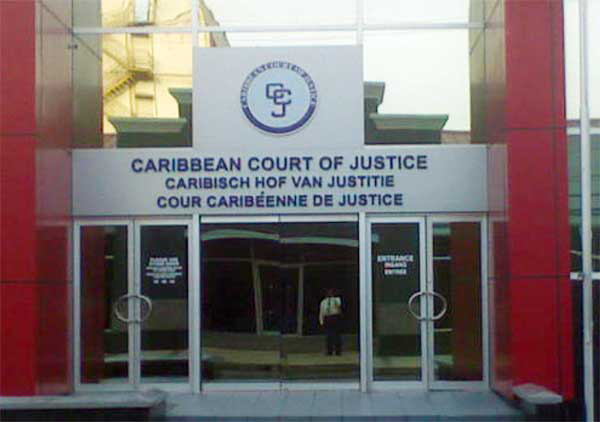Leader of the Opposition Bharrat Jagdeo has applied to the Caribbean Court of Justice (CCJ) to appeal the Guyana Court of Appeal’s decision by majority to invalidate December’s no-confidence vote against government, while saying that the meaning of a majority of the 65 elected members of the National Assembly was misconstrued by the judges.
Attorney Anil Nandlall filed the application on behalf of Jagdeo yesterday, making it the second application within two days to be filed to the CCJ requesting special leave to appeal the recent majority decision of the local court.
The first application was filed by attorneys on behalf of Christopher Ram. In a brief statement, Nandlall said there will be a Case Management Conference (CMC) conducted by the CCJ on Friday in respect of the matter. “We expect that directions will be given by the Court, which will bring about an early hearing and determination of the appeal,” he said.
Jagdeo’s application, which lists Attorney General Basil Williams, Speaker of the National Assembly Dr. Barton Scotland, and representative of the A Partnership for National Unity Joseph Harmon as the respondents, seeks an order granting special leave to appeal the majority judgment of the Court of Appeal of Guyana, made by acting Chancellor Yonette Cummings-Edwards and Justice of Appeal Dawn Gregory, with Justice of Appeal Rishi Persaud dissenting.
Furthermore, it requests that the court grant an order to treat the hearing of the application as urgent and for it to be expedited. Additionally, the court is being asked to direct that the hearing of the application for special leave to appeal be treated as the hearing of the appeal and that six orders be granted in this regard. These are for: an order setting aside and/or reversing the majority judgment of the Court of Appeal of Guyana and restoring the decision of the acting Chief Justice; a declaration that Resolution of the National Assembly No. 101 upon the passage of the motion is valid and effectual; a declaration that the no-confidence motion moved by the Leader of the Opposition was validly passed on the December 21st, 2018 by a majority of all the elected members of the National Assembly; a declaration that 33 votes/members constitute a majority of all the elected members of the National Assembly within the meaning of Article 106 (6) of the Constitution of Guyana; costs in the Caribbean Court of Justice; and such further or other order/s as may be just and appropriate.
Chief Justice (ag) Roxane George-Wiltshire SC, in January, found that the 33 votes in favour of the motion constituted the needed majority of the 65-member National Assembly, which was successfully passed and that this should have triggered the immediate resignation of the Cabinet, including the President.
However, last week, Justices CummingsEdwards and Gregory both agreed that 34 votes were required to guarantee the motion’s successful passage. Their decision outweighed that of Justice Persaud, who had dissented and endorsed the Chief Justice’s ruling.
By a two to one ruling, the no-confidence vote was therefore invalidated.
According to Jagdeo’s grounds for his application, the majority of the Court of Appeal misconstrued Article 106 (6) of the Constitution in coming to the decision that 34 constituted a majority within the meaning of Article 106(6); the majority misunderstood the use of the term “majority” in the Constitution; and erred in law by finding that a total of 34 votes were needed for the motion to be passed.
The application states that the issue of the validity of the vote is of great national importance, as the passage of the motion “triggers serious Constitutional consequences of national importance, including the resignation of Cabinet and the holding of National and Regional elections.”
Therefore, it concludes that the resolution of the appeal will be to the general benefit of the people of Guyana.
“There is a real prospect of success in the proposed appeal. More elected members voted in favour of the motion than voted against and all members voted. On the plain and ordinary meaning of the words used in article 106(6), the motion was carried by a majority of elected members,” it states.
It adds, “At all material times, it was the clear, settled and unequivocal understanding of all the elected Members of the National Assembly that 33 votes constitute a majority for the passing of a No-Confidence Motion provided for and contemplated by Article 106 (6) of the Constitution.”
The application notes that government had accepted the vote initially, as evidenced by the actions of the Prime Minister, who, during a press conference immediately following the vote, admitted to the government’s defeat, the need for the President and Cabinet to resign and the requirement for elections to be held within three months.
It was further noted that subsequently, the President reiterated these sentiments publicly. “The Applicant and the people Guyana whom he represents in the National Assembly suffered a grave miscarriage of justice which may only be remedied on appeal to the Caribbean Court of Justice,” the application argues. “Given that if the no confidence vote is valid, an election was constitutionally required to be held by 22nd March, 2019, the Applicant has opted to apply to this Honourable Court for special leave to appeal instead of applying to the Court of Appeal for leave to appeal in order to save valuable time and to limit the time during which the Government is allowed to remain in office in breach of the Constitution,” it adds.










